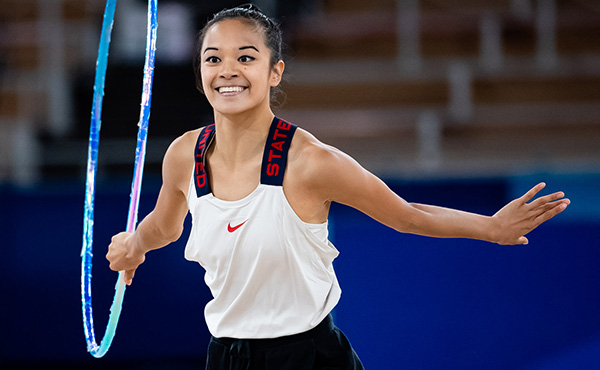
The United States’ most decorated rhythmic gymnast is not done yet.
"You know the phrase," Laura Zeng said. "It’s hard getting to the top, and it’s even harder staying there."
But she has successfully stayed at the top – and for a very long time. After three years on the U.S. rhythmic gymnastics Junior National Team, during which time she won the bronze medal at the Youth Olympic Games, Zeng moved straight to the top of the senior division. She has won six consecutive senior all-around titles at the U.S. national championships.
Zeng is the rare athlete whose early childhood achievements have translated into a long, consistently successful career. But don’t let that fool you into thinking it’s all been easy.
Zeng was focused and hard-working from a young age. One early memory that stands out to her: "I was in Level 5 and that was my first JO’s [Junior Olympics], and I won. I was like 8 years old. That was super, super exciting and the first time I was like, ‘Oh my gosh, look at all this hard work that really paid off.’"
Inspired by seeing the results of her effort, Zeng kept giving her all year after year. Her love for the sport made it all possible.
Zeng’s mom, Lily Chen, remembers how a preschool-aged Laura stood, entranced, as she watched a YMCA dance class. The teacher noticed Laura’s interest and invited her to join the class. Then, Zeng surprised everyone with her abilities; the teacher even asked if she could come to another class to serve as an example for the other students. A few years later at age 7, she found rhythmic gymnastics through a friend who had started doing the sport.
Her journey since that time has progressed step by step. Even though Zeng demonstrated talent early on, she didn’t assume that going to the Olympics would be a given.
"In 2015 I was just working hard, I was just working on myself, and I happened to do really well, and I got to go [to the Olympics]," she said. "It was unexpected, honestly."
But since that time, she has settled more into her role as a leader within rhythmic gymnastics. "After 2016 it was like, now I’m actively going for Tokyo," Zeng said.
Yet when the pandemic struck, the path to the Games took an unexpected turn. "You have this goal that’s in the back of your mind and you go for four years, and then a pandemic happens and you have to wait another year to pursue the goal," Zeng said, reflecting on her train of thought last year.
The coronavirus forced practices to move to a Zoom format for several months, competitions paused for almost a year, and the Tokyo Games were pushed back to 2021. Zeng used the extra time for "fine-tuning" her skills and routines. After all, she said, she always has more she’d like to accomplish.
At 21, Zeng’s rhythmic gymnastics career has been a relatively long one. She got into Yale three years ago, but she’s taken multiple gap years in order to focus on training for the Olympics. In the meantime, Zeng has enrolled in local community college classes–primarily, she said, because she likes to keep learning.
"I’m the grandma now," Zeng joked. But her maturity has proven helpful in gymnastics, allowing her to improve in new ways.
Under the current rhythmic gymnastics Code of Points, there is no longer any limit on a routine’s difficulty value, and athletes no longer submit score forms that spell out what skills they will do. As a result, it’s more important than ever to know one’s own routine inside and out.
Zeng’s coach, Natalia Klimouk, said Laura is a strategic competitor who knows exactly what she needs to do to get credit for her skills.
"She’s going to fight for every single tenth," Klimouk said, adding, "Laura is a super professional person. She doesn’t lose any minute in practice."
But aside from acting strategically, Zeng also wants to enjoy her time in gymnastics.
"My goal when I get to the Olympics is at that point, the work should be done and it should be about enjoying the experience," she said.




